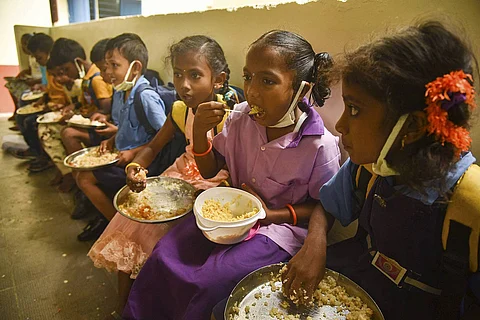

The contentious implementation of the National Education Policy (NEP) - 2020 in Karnataka has yet again come into focus. A few days ago, a position paper submitted by Karnataka included suggestions that described the Pythagoras theorem and the story of an apple falling on Isaac Newton as fake news. It also proposed Sanskrit as a third language subject for students up to Class 12.
Now, another position paper submitted to the state government on ‘health and wellbeing’ is under the scanner. The paper says that “eggs, flavoured milk, biscuits, should be forbidden to prevent obesity and hormonal imbalance” in children, and that “serving other recipes or foods to the same graders, such as egg versus grams, or egg versus banana, leads to a nutritional imbalance among children”. This can result in complexes developing in children leading to “emotional distress”, the paper claims, adding, “treating all children equally and with no to ‘Pankti Bedha’ (food discrimination) is authentic Indian philosophy or Dharma.”
The position paper is one of 26 written on various subjects by committees of experts in those fields, which will be submitted to the Union government and the NCERT. The report on ‘health and wellbeing’ is headed by Dr K John Vijay Sagar, the head of the Department of Child and Adolescent Psychiatry at NIMHANS. The others in the group include senior medical professionals, as well as an Ayurvedic physician and a yoga therapist.
The paper has also come under scrutiny for promoting right-wing material, placing specific importance on ‘Indian concepts of health’. An entire section of the paper has been dedicated to this, which claims that one must be healthy in order to fulfil the “four goals of life”: Dharma, Artha, Kama and Moksha. It also advocates for the “forgotten wisdom” of ancient India, and quotes the “four principles of life” given in the Ayurvedic treatise Charaka Samhitha. Recently, a row erupted in Tamil Nadu when a group of first-year medical students were made to administer the Charak Shapath, which is derived from the Charaka Samhitha. It was criticised for being deeply regressive and casteist.
The paper advocates for “traditional” food which has been “passed down for many generations”. There is also a table included, of what people eat and whether they are ‘good’ or ‘bad’.
High amount of sugar, salt, meat: Bad
“Food that has been prepared in grandmother’s way”: Good (Yes, it really says that)
Apart from Ayurveda, a whole section is also dedicated to the benefits of yoga. The expert committee is of the opinion that yoga is essential for all-round development. “Most of us live often in deep suffering and even the youth feel so worn out. Yoga brings all over personality development,” it said, adding, “Yoga is essentially a creative process of perfection and yogic research gives us the secret of the perfection and integration of personality.”
The position papers will not be implemented immediately or even in the next academic year, Madan Gopal, the head of the NEP 2020 task force, told The New Indian Express. He said that expert committees in each state have come up with similar position papers, and that they will all be reviewed by the NCERT and Union government before being implemented.